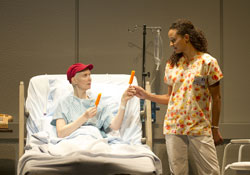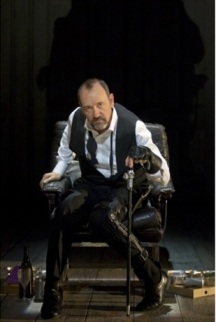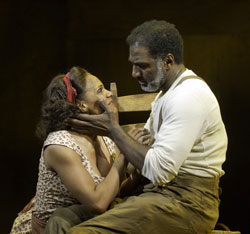Category: "Review"
Review: Wit
Jan 27th

Margaret Edson has just written one play in her life, the brilliant Wit, now receiving its Broadway premiere a mere seventeen years after it was first produced and went on to win nearly every theater award, including the Pulitzer Prize. This new incarnation could well result in another accolade: a Tony for Best Revival of a Play.
Anyone who saw the brilliant Kathleen Chalfant in the original Off-Broadway production might wonder whether Cynthia Nixon would be as effective in the role of Vivian Bearing, a poetry professor suffering from Stage IV ovarian cancer. But while Nixon offers a quite different, less officious interpretation than her predecessor, she is no less affecting.
Her character acts as the play’s narrator, directly addressing the audience in telling the story of the diagnosis of her affliction and her subsequent agreement to an experimental chemotherapy treatment that will not cure her but rather provide much needed data for the medical researchers handling her case.
It’s grim stuff, to be sure, but the play beautifully balances pathos with humor in its depiction of the emotional and mental anguish that Bearing undergoes as she becomes little more than a research subject for her doctors. Along the way, flashbacks reveal her earlier life, from when she was a young girl hungry for knowledge to her distinguished career as a professor specializing in the works of the 17th century John Donne--famous, of course, for the line “Death be not proud.”
The playwright once worked in the cancer unit of a research hospital, and clearly knows the terrain well. She beautifully captures the unthinking casual breeziness of the doctors, including one young researcher (Greg Keller), who used to be Bearing’s student and who treats her with the same rigorous exactitude that she applied in her classroom.
There is no shortage of heartbreaking scenes, most notably one towards the end involving a visit to the dying Bearing by an elderly woman (a superb Suzanne Bertish) who was once her professor and who climbs into bed with her and reads her a children’s story while gently stroking her hair.
Under the sensitive direction of Lynne Meadow, the supporting players--including Michael Countryman as a doctor supervising the case and Carra Patterson as a friendly nurse and the only person who actually treats the patient as a person—deliver sterling work. But it is Nixon, perfectly conveying her character’s combination of emotional reserve, acerbic wit and brilliant intellectualism—“It’s highly educational, I am learning how to suffer,” she remarks at one point about her ordeal—who powers the production. Her sublime, deeply affecting portrayal, for which she bares both body and soul, is a revelation.
Samuel J. Friedman Theatre, 261 W. 47th St. 212-239-6200. www.Telecharge.com. Through March 11.
Review: Richard III
Jan 19th

Reunited with his American Beauty director, Sam Mendes, Kevin Spacey pulls out all the stops with his devilishly entertaining turn in the title role of the Bridge Project’s production of Richard III. Stepping into the footsteps of such illustrious predecessors as Laurence Olivier, Al Pacino and Ian McKellen, the actor delivers a performance that is as much comic as it is menacing, but is always mesmerizing.
The final offering of this ambitious transatlantic theatrical collaboration among the Brooklyn Academy of Music, The Old Vic and Neal Street, the production is not exactly subtle in its approach. Mendes seems to be working for maximum shock value most of the time, and the actors have clearly been encouraged to not hold back. The result is a less than nuanced Richard, but certainly one that well conveys the sensationalistic aspects of Shakespeare’s history play.
Spacey, fitted with a leg brace and a hunchback, establishes the dark comic turn right from the start, when he punctuates his delivery of the famous “Now is the winter of our discontent” speech by tooting on a party noisemaker. His Richard is clearly one who relishes his villainy, and delights in sharing his glee with the audience. He makes us fully aware of the cleverness of his elaborate machinations, and while some of the embellishments are a bit much—I could have done without the Groucho Marx impersonation—he’s wildly entertaining from start to--some three-and-a-half hours later--finish
Mendes’ modern-dress production is powerfully effective, although its devices are by now all too familiar. Video projections are used extensively, most effectively in which we see a close-up of an offstage Richard as he pretends to resist the crowd’s clamoring for his ascension to the throne. And though every modern Shakespearean production seems to employ a percussionist or two, their use here well signals the growing tension.
The ensemble, a mixture of American and British actors, offer good support, with particularly striking turns by Gemma Jones, scarily intense as the wronged Queen Margaret; Haydn Gwynne, haughtily imperious as Queen Elizabeth; and Annabel Scholey, touchingly vulnerable as Lady Anne.
But the evening is all about Spacey, whose physical energy and emotional intensity never flags in the second longest Shakespearean role after Hamlet. His obvious exhaustion at the curtain call, just after a terrific coup de theatre in which Richard’s corpse is displayed to the audience in a manner recalling Benito Mussolini’s, seems entirely deserved.
BAM Harvey Theater, 651 Fulton St., Brooklyn. 718-636-4100. www.bam.org. Through March 4.
Review: The Road to Mecca
Jan 18th

The plays of Athol Fugard often require heavy lifting on the part of an audience. That’s particularly true of his 1987 drama The Road to Mecca, now being given its Broadway premiere in a revival by the Roundabout Theatre Company. This tale of an elderly woman artist rebuffed by her community represents the playwright at his talkiest and most didactic. Still, it has its moments of quiet beauty, and its return is welcome if only for the opportunity to see the luminous Rosemary Harris onstage.
Director Gordon Edelstein has assembled a stellar cast for the production: Carla Gugino plays Elsa, a schoolteacher and friend of Harris’ Miss Helen, and Jim Dale is Pastor Marius Byleveld, a role that was originally played by the playwright himself.
Miss Helen is based on a true-life figure, Helen Martins, who lived in the remote Karoo region of South Africa where the play is set. At the play’s beginning, it’s established that has become a depressed, reclusive figure, shunned by her fellow villagers because her iconoclastic artworks, with which she has copiously decorated her house and garden, offend their religious sensibilities.
Her friend Elsa, concerned for her friend’s plight, has traveled hundreds of miles from Cape Town to see about Miss Helen’s health and to urge her to resist any efforts to dislodge her from her home. The play’s 65-minute first act consists of a rambling, repetitive conversation between the two, the general banality of which will tax even the most tolerant theatergoer’s patience.
Act II picks up considerably with the arrival of the pastor, who speaks to the clearly emotional fragile Miss Helen in a soothing, solicitous manner that only partially conceals the intolerance underlying his arguments.
Although this part of the play is indeed livelier, thanks in no small part to Dale’s energetic presence, it’s also filled with the sort of heavy-handed metaphors with which Fugard frequently infuses his more labored works. There’s also a lot of candle lighting—Miss Helen uses them as the sole illumination in her house, and they figure in a less than incendiary plot revelation—but the overall dimness isn’t alleviated.
Harris is, as always, exemplary here, delivering a subtle, graceful performance that touchingly makes clear her character’s underlying vulnerabilities. Gugino is appealingly feisty, and Dale provides a welcome liveliness as the pastor whose motivations are more complex than they initially appear.
Michael Yeargan has provided a wonderfully detailed, eccentric set—one that supposedly replicates the real-life subject’s home, which is now a tourist attraction—even if Peter Kaczorowski’s necessarily dim lighting, designed to replicate the effects of all those candles—makes it rather hard to see clearly.
American Airlines Theatre, 227 W. 42nd St. 212-719-1300. www.roundabouttheatre.org.
Review: The Gershwins' Porgy and Bess
Jan 13th

Composer Stephen Sondheim will probably be appeased when he sees The Gershwins’ Porgy and Bess, the reconceived revival of the classic opera by George and Ira Gershwin and, oh yes, librettist/lyricists DuBose and Dorothy Heyward. Many of the radical changes that Sondheim objected to so publicly in his letter to The New York Times have been abandoned, with the result that this version is more or less faithful to the original, minus 45 minutes or so of its running time.
But it’s not just the length that has been diminished. Although this production has its terrific elements and is well worth seeing (especially considering how seldom the show is done), it fails to fully convey the power of this magisterial work.
While the singing by Audra McDonald and Norm Lewis in the title roles is glorious, the magnificent score, adapted by jazz composer Dierdre L. Murray, is not fully given its due. The problematic sound system prevents the 22-piece orchestra from coming across with the necessary power, with the result that the music sounds like it’s being piped in from another theater altogether.
The visuals, too, are a problem. Rather than conveying the teeming life of Catfish Row, Riccardo Hernandez’ stark tin wall set more closely resembles an abandoned warehouse. And the costumes by ESosa are not artfully drab, just boringly so.
The book adaptation by Pulitzer Prize winner Suzan-Lori Parks (Topdog/Underdog) condenses the original in reasonable fashion, and even improves it times, such as in the powerful Act II scene between Bess and Crown (Philip Boykin) that is here charged with ambiguity and sexual tension.
For the most part, however, the production is never fully galvanizing, perhaps because the reduced staging by Diane Paulus lacks the operatic intensity that the show requires. It’s interesting to note that another theater-style production directed by Trevor Nunn in London met with similar complaints and a lack of box-office interest several years ago.
Still, one doesn’t often get the opportunity to hear gorgeous songs like “I Got Plenty of Nothing,” “Bess, You Is My Woman Now” and “I Loves You Porgy” sung by voices of the caliber of Lewis and McDonald’s. The former’s warm baritone envelopes you like a heavy coat on the winter’s night, while the latter’s gorgeous soprano is consistently ravishing. Just as importantly, they bring a heartbreaking depth to their characterizations—just try not to cry during the final moments, when Lewis’ Porgy sings “I’m On My Way,” about journeying to New York City to reclaim his lost love.
Although he tends to overplay at times, David Alan Grier is a generally terrific Sporting Life, and brings a welcome urgency to such numbers as “It Ain’t Necessarily So” and “There’s a Boat That’s Leaving Soon.” The physically formidable and vocally commanding Boykin is a scarily intense Crown, while Nikki Renee Daniels, Joshua Henry and Bryonha Marie Parham are impressive in their supporting roles.
Richard Rodgers Theatre, 226 W. 46th St. 800-745-3000. www.ticketmaster.com.
Review: Outside People
Jan 11th

The Chinese language is all that one seems to be hearing lately. Not only did presidential candidate Jon Huntsman resort to Mandarin while rebuking Mitt Romney during a recent debate, but David Henry Hwang’s Chinglish, currently playing on Broadway, has much of its dialogue delivered in Chinese with English supertitles for those audience members who don’t happen to be multi-lingual. Like that play, Zayd Dohrn’s Outside People also deals with cross-cultural themes concerning a hapless American visiting China who finds himself in way over his head.
Co-presented by the Vineyard Theatre and Naked Angels, this dark comedy concerns a young American, Malcolm (Matthew Dellapina), who has traveled to Beijing to work for his old college buddy Da Wei, or David (Nelson Lee), a successful businessman who prides himself on his ability to bridge Eastern and Western culture. On his first night there, the severely jet-lagged Malcolm finds himself set up with the gorgeous Xiao Mei (Li Jun Li).
Despite Malcolm’s awkward shyness and inability to speak Chinese, the pair quickly hit off. They begin a tentative romance, which is further complicated by the fact that she’s been hired to tutor Malcolm in Chinese. But when the relationship starts to turn serious, David forcefully expresses his objections, claiming that Xiao Mei is only using Malcolm to make a new life for herself in America.
There’s an complexity and ambiguity to the characters—the fourth being Samanya (Sonequa Martin-Green), David’s girlfriend, a transplant from Cameroon—that makes the play consistently intriguing even if it never quite lives up to the ambitiousness of its themes. But under the skillful direction of Evan Cabnet, it moves along briskly, and the pungently comic dialogue garners many laughs. The playwright is admirably unafraid to not spell things out, the best example being the scene depicting an intense confrontation between David and Xiao Mei that is all the more compelling for its being spoken in Chinese, with only the performers’ body language and vocal delivery cluing us in to its meaning.
The performances are terrific: Dellapina infuses Malcolm with a comic, Woody Allen-style neuroticism; As Xiao Mei, Jun Li is both sexy and sweet while subtly hinting at an underlying steeliness; Lee is hilarious as the swaggering, macho David; and Martin-Green brings an edgy sultriness to Samanya.
Vineyard Theatre, 108 E. 15th St. 212-353-0303. www.VineyardTheatre.org. Through Jan. 29.